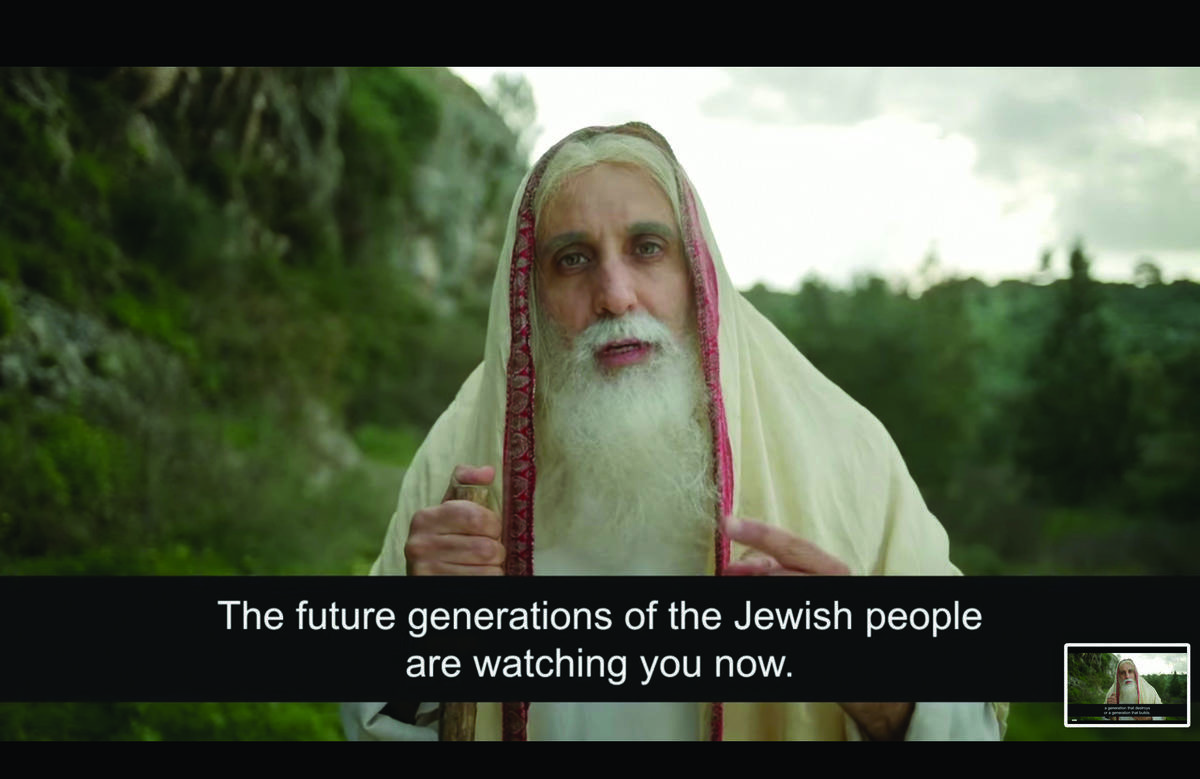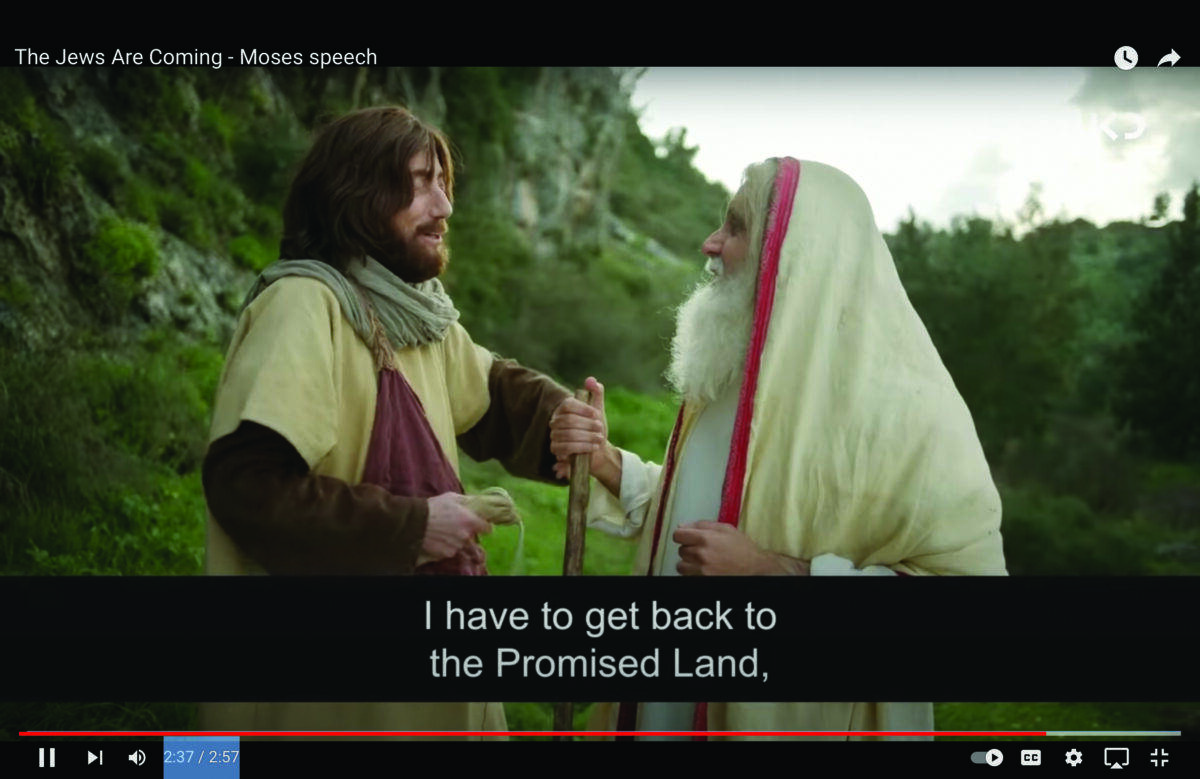Israelis have long taken pride in two things: the long arc of Jewish history, and their relentlessly dark humor in the face of unspeakable tragedy.
For about a decade, the synthesis of those two qualities has been The Jews Are Coming, a sketch comedy show now in its sixth season on Kan, Israel’s public broadcaster.
Nearly every sketch in the show satirizes an event from millennia’s worth of Jewish and Israeli religious texts and history. Its guiding principle is irreverence.
The show’s catalog includes spoofs of the story of Purim and the invention of the mezuzah, but it also features joke after joke about the Nazis, the Spanish Inquisition, the Yom Kippur War, the destruction of the Second Temple in ancient times and any number of other lachrymose episodes of the Jewish past. In the opening credits and between sketches, the show displays the tools used in a ritual circumcision.
So, after Oct. 7, the program confronted a question: What to do when the tragedy isn’t historical but current and — for many Israelis — ongoing?
Last month, we got our answer: In unprecedented times, The Jews Are Coming did something unprecedented: It got serious.
In two segments posted online, which opened and closed out a recent episode, the comedy show hardly aimed to elicit any laughs, but gave viewers a window into where Israelis’ heads are at more than seven months after Oct. 7.
Both sketches take place in what look like typical Jews Are Coming settings. In the opening video, the biblical Moses, a recurring character on the show, praises Israelis for their spirit of generosity after the attack.
“I saw how you’re volunteering, how you’re hosting guests, how you pile into vans to go and cheer up evacuees, or to dance with soldiers, to bring some happiness to this sad time,” he says. “You really surprised me. You’re a great nation, and you deserve to hear it.”


The closing video begins with Yael Sharoni, one of the show’s actors, dressed in robes indicating ancient times in front of what looks like a wall from the Old City of Jerusalem. Text on screen reads, “Jerusalem, 70 CE.”
“It was the morning of the ninth of Av,” she begins, looking troubled, in a reference to the day when the Second Temple was destroyed by the Roman Empire. “We were awakened by a terrifying noise. We didn’t know what was happening, until we understood that the Romans had started burning the temple.”
A second later, looking terrified, Sharoni’s character says, “Then we heard shrieking from the house next door.”
The scene shifts to a man in medieval garb, from Cologne in 1096, during the crusades, who picks up the narrative where Sharoni’s character left off. He is followed by Jewish survivors of the 1903 Kishinev pogrom, the 1929 Hebron massacre, Kristallnacht in 1938 and the Farhud, an antisemitic pogrom in Baghdad. Each describes witnessing the murder of Jews and their own fears of their families getting killed by violent antisemites.
Finally, the narrative shifts to a woman in contemporary clothes and full color, alongside the text, “Kfar Aza, 2023.” The community was one of the sites hit hardest by the Oct. 7 attack.
“Everyone asks if we can go on living with this,” she says. “We have no choice. We must carry on, step by step, and start rebuilding from scratch.”
The message is clear: With global attention increasingly turned to devastation in Gaza, the video relays the Israeli perspective that Hamas’ attack — which killed approximately 1,200 people, destroyed Israeli communities and took some 250 people hostage — is just the latest in a long line of antisemitic massacres that the Jews have overcome. It also reflects that Israelis’ focus remains on the tragedy of the Hamas attack and its aftermath rather than on the tens of thousands of Palestinian casualties.
“In October we got a slap in the face not just from Hamas but from all of history — from Pharaoh, Amalek, Haman, the Cossacks, the Mufti, Hitler — those who in every generation rise up against us,” Natalie Marcus and Asaf Beiser, the show’s creators, posted in a statement online. “At difficult moments, when the present is intolerable and the future is clouded with fog, the past has a special power: It’s a source of comfort, guidance, and, above all, a sense of proportion.”
Both videos, uploaded with English subtitles, are directed at an Israeli audience as well as a global one. And both, aiming for a unifying tone, come from a show that has divided Israelis in the past. Its premiere a decade ago was delayed for months after a promo clip satirizing right-wing extremist murderers from Israeli history drew charges of political bias.
Orthodox rabbis have complained about depictions and invocations of Jewish tradition, and critics staged a protest against the show in 2020 that drew thousands of people. The show includes a disclaimer at the beginning of each episode that says “We apologize in advance” if anyone is offended.
The show’s creators appear wise to the fact that messages of shared destiny may ring hollow at a time when their country is both deeply traumatized and deeply divided. In the Moses segment, he cautions Israelis not to yield to the forces pulling them apart.
“Remember what you’ve been like in this time, without fighting or shouting or civil wars. And decide what kind of generation you want to be: a generation that destroys or a generation that builds. The future generations of the Jewish people are watching you now,” he says.
Because it is, after all, a comedy show, he adds, “Past generations are watching too, but that’s because there’s nothing better to do. We don’t have Netflix.”
Still, he ends on a hopeful note: “I know this is a tough time, but remember, I got past Pharaoh — you can get past this.”
Whether the message of Jewish endurance will register in today’s Israel and around the world is unclear. But online, where the segments took off as soon as they were posted, in part because of the addition of English subtitles, there were signs that they were hitting their mark.
Check out the segments at:
https://www.youtube.com/watch?v=Zt7EcV8h1Qo
https://www.youtube.com/watch?v=KjwrV0wG9E0

